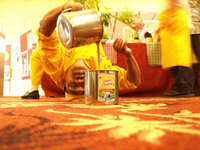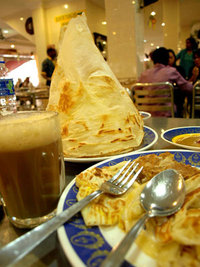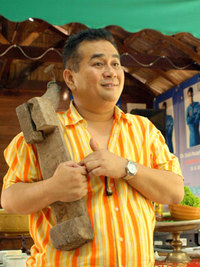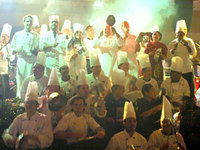Story by Mallika Naguran

Penang rocks!
To paraphrase, it’s “Malaysia can”. This arm-thrusting slogan was coined to reflect Malaysia’s sentiment to conquer all odds.
Politicians grunt it, and so do foreign music performers, apparently, when they feel the masses move beneath their hands.
And move they did the hearts, bodies and minds of bright-eyed Asian folks at the second annual Penang World Music Festival held at the charming quarry garden flanking the Botanical Gardens in Penang Island. Young and old bobbed and grooved to the strains, vocals and rhythm of 11 international bands from Croatia, Reunion Islands, France, Kenya, Denmark, Tibet (famed and exiled Techung), Mexico, Iran, India, Canada and US of A. See line up below and watch this section for album reviews and interviews.
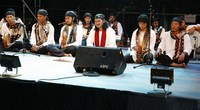
Rhythmic percussion by Kumpulan Dendang Anak.
The infectious Kumpulan Dendang Anak of Trengganu, one of the four Malaysian bands to be featured, roused the crowds to their feet with their gendangs, rebanas, konpangs and more. They proved that age-old traditions and heritage still, to this day, send a tingle. “We brought back folk music that existed 600-700 years ago that would have otherwise gone extinct,” beamed leader and performer Zulkifli Ismail who blends gongs and gamelans with the acoustic guitar.
“Everybody plays for tradition,” said Gilberto Guttierez of Mexican Mono Blanco, adding that where they come from, the farm, that is, happy hour equals song, dance and music, of course.

DYA Singh passes down generations of hymns.
Tradition need not be boring or out of date, and this perhaps is the beauty of world music where a bit of experimentation
fuses myriad of tones from different sound boxes. It doesn’t matter where it comes from, what it’s made of or which century it originated in. The tabla for instance, an ethnic Indian percussion instrument, served centre stage in DYA Singh played by world-renowned Nepalese-born Dheeraj Shrestra. The group mixes beats of tabla with Greek bouzouki, harmonium and the Australian didgeridoo. “The beauty of the group is the spirit of the music, dance and rhythm,” says Dheeraj. Watch Dheeraj perform this 10 May at Nepalese Pagoda, South Bank, Brisbane.
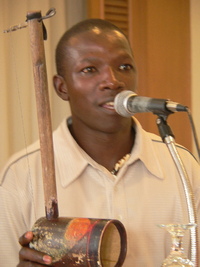
George Achiem resurrects oruto's appeal in Kenge Kenge.
Kenge Kenge’s dynamic leader and lead vocalist George Achiem resurrected a dying string instrument he saw being played in the market when he was a little boy. The one-string oruto provides a feminine counterpoint to pounding beats, between booming drums and calls of the rustic horn of this band from sunripe Kenya. “The whole band uses traditional instruments, some with eight strings, some with one. We really love our culture,” he grinned.
And so did we. For three days, Malaysians and tourists, even invited journalists, were mesmerized by the mind-blowing cultural experience. “This is what world music should be, full of ordinary people, children and screaming teenagers appreciating the acts, most of which are of very high standard,” said Singapore writer, actor and musician Joe Ng. “I stopped going to WOMAD of Singapore few years back because it became such a soulless, yuppie thing.”

Electric and eclectic Afenginn infuse wild Nordic folk with Finnish nuances on the mandolin.
Even the absence of alcohol sale on the grounds did not deter anyone from getting a bit high during the three-day packed concert beginning May 2.
The music itself did the trick in lifting the spirits and screwing the brains (blame it on the Danish lot, Afenginn) with traditional instruments, lilting folklore, syncopated beats, surreal chants and head banging rhythms.
George Achiem best sums up the value of upholding traditions. “When we play our music overseas, we leave a bit of our culture behind and we learn new cultures from others.” This cultural exchange binds people together as they see beyond their inner worlds to understand and appreciate different perspectives.
“Music is the universal language, man,” said Brian the keyboardist of Techung as he pumped fists with Mame Khan, Badila’s Rajahstani singer at the post concert party. “I didn’t understand what you sang, man, but you know what, it didn’t matter. It’s all in the music, man.”

Music is the universal language.
I couldn’t agree more. If I were you, I’d make a date for the next Penang World Music Festival about the same time next year. Don’t forget to stay on for a few more days as Penang is lovely and harbours the best Malaysian food, like my favourite spicy sour assam laksa. Or if you can’t wait that long, head on down to the sizzling Sarawak Rainforest Festival 11-13 July. Book now to avoid disappointment - it’s a sell out I hear.
Akan Datang! Watch this space for more world music previews and reviews. View show video and more photos in Gallery.
Coming up soon: Afenginn on cheerful melancholy and rational madness. Only they can make this happen. Listen to their tracks here.
Coming up sooner: Internationally-acclaimed Techung writes the songs for Tibetan freedom
Gaia Discovery Rates the Show
Friday May 2 Day One
DYA SINGH (PENANG & AUSTRALIA) ***
TEADA (IRELAND) ****
KUMPULAN DENDANG ANAK (TERENGGANU, MALAYSIA) ***
MONO BLANCO (MEXICO) **
AFENGINN (DENMARK) *****
SALEM TRADITION (REUNINON ISLANDS) *****
Saturday May 3 Day Two
KUMPULAN KINABALU MERSU SOUND (SABAH) **
BADILA (IRAN, INDIA, FRANCE) ***
GALANT, TU PERDS TON TEMPS (CANADA) ***
DIPLOMATS OF DRUMS (KUALA LUMPUR, MALAYSIA) *
KRIES (CROATIA) ***
Sunday May 4 Last Day
TECHUNG (TIBET) ***** Watch videos
BALFA TOUJOURS (USA) ***
LO COR DE LA PLANA (FRANCE) *****
AFENGINN (DENMARK) *****
* Loo time
** Nice, but where’s the oomph?
*** You got me
**** Yeah baby yeah
***** Call the police. Roof is falling down here!
This show was made possible by the Ministry of Tourism Malaysia and Penang Tourism Action Council. It was made successful with resourceful festival artistic director Yeoh Jun-Lin and brilliant sound producer Niall Macaulay of Cheer Productions.
Photos by Joe Ng, Tourism Malaysia and Mallika Naguran
